There are several ways a business can become more sustainable – reducing waste, using sustainably sourced materials, even adopting cleaner shipping processes – and Berks business owners are trying it all. By focusing on minimizing their impacts to the environment and to society, these local businesses are maximizing their effect on our local community and beyond.
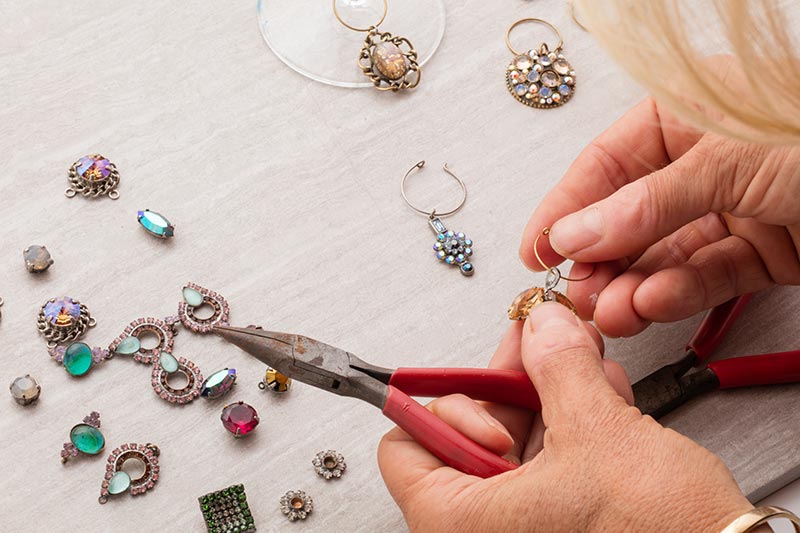
Sorrelli
The female-founded and led team at Kutztown-based Sorrelli is dedicated to ensuring not only the longevity of their handcrafted and ethically sourced jewelry, but also preserving the planet for generations to come. Because they run their own factory and make every piece by hand, they can repair and refurbish every item they sell, keeping their jewelry in the hands of their customers and out of landfills. It also means they can ensure no materials go to waste. From recycling and re-using packing materials to storing and cleaning wastewater on-site, Sorrelli has prioritized leaving a small footprint.
“We have such an abundance of waste in our society, from single-use plastics to textile waste to paper, the list goes on and on,” says CEO Lily Oswald. “My goal is to work with innovators who can help create processes to recycle these waste products into new materials.” She’s starting with creating new jewelry components from recycled glass and plastic, and she isn’t stopping there. Lily and her team are innovating a new upcycling program that allows customers to send in their old Sorrelli pieces to be used in new and creative ways and have partnered with EcoDrive to plant trees in an effort to offset the impacts of shipping sorrelli.com orders.
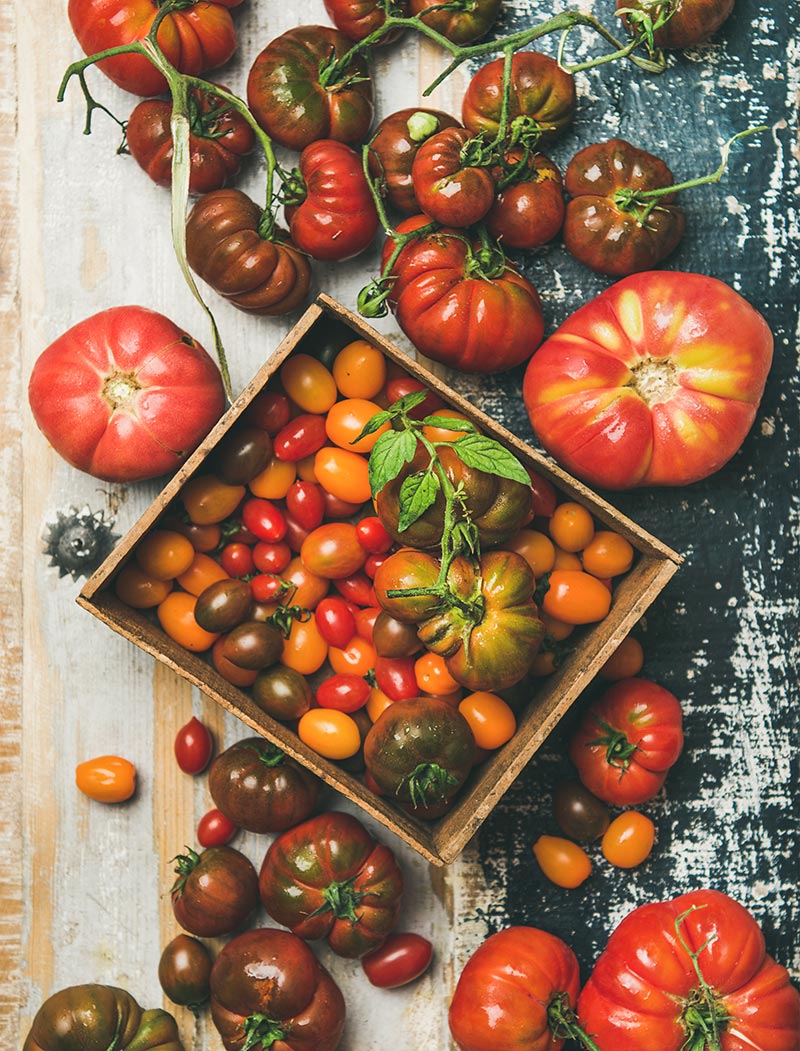
Eckerton Hill Farm
Owner Tim Stark started his first tomato seedlings on the rooftop of a Brooklyn brownstone more than 20 years ago and has since expanded into 70 hillside acres in the fertile Oley Valley. While he is best known for his more than 100 varieties of heirloom tomatoes and fresh and fiery peppers, he grows more than 200 varieties of fruits and vegetables. Tim says, “We grow everything from A-to-Z, artichokes to zucchini, and everything in between,” and his crew strives to pick, pack and sell everything within a day or two for some of the freshest produce around.
But what really sets Eckerton Hill apart is Stark’s focus on optimizing the nutrient composition of his soil. He has made the centuries-old process of cover cropping integral to his business, allowing him to farm without the use of fertilizer or chemicals. He composts and combines hundreds of bushels of rye, barley and clover each season to rotate into his fields to improve the soil between crops. Eckerton Hill produce is featured at the Union Square Greenmarket and in some of the poshest restaurants in New York City, but is also available right here at the Covered Bridge Farm Stand and Oley Valley Organics as well as at the Stark Juice kitchen in Kutztown and online at eckertonhillfarm.com.
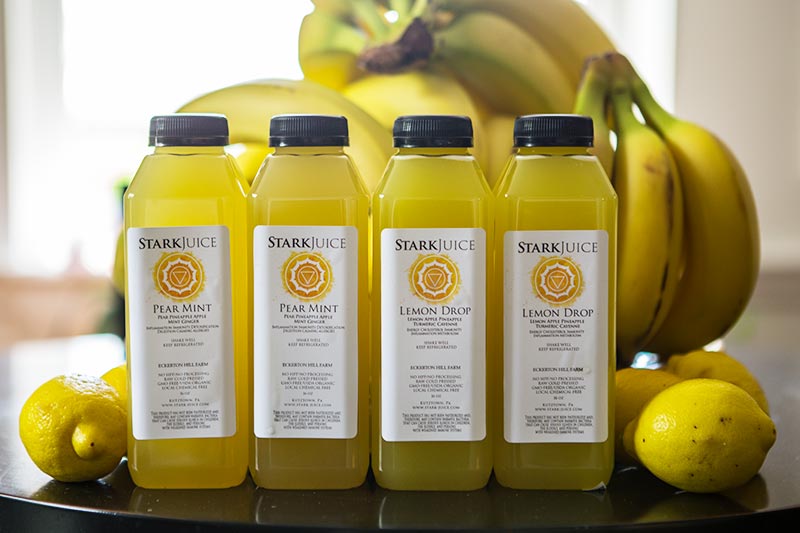
Stark Juice
Julie Stark’s raw cold-pressed juices deliciously embody her vision that all people deserve organic, chemical-free, healthy ingredients. Her products are made with nothing but the juice of local, organic and ethically sourced fruits and vegetables. Stark Juice is free of all pasteurization, processing, preservatives, sweeteners, fillers and water to ensure the best absorption of the nutrients and natural compounds found in every bottle.
Julie sources most of her ingredients right here in the Oley Valley. She works with her brother Tim Stark, owner of Eckerton Hill Farm, to plan her produce needs. Once she has squeezed every ounce of goodness from the fruits and vegetables, she uses the dry pulp to create more tasty products like veggie beet burgers and chips or returns it to the farm where it can feed livestock or be used as compost to grow more produce. “It’s a beautiful circle of sustainability,” Stark says. “We continue to slowly and sustainability evolve the business in an economic and planet-friendly way.” Stark Juices can be found at the juice kitchen in Kutztown, as well as the West Reading and Boscov’s Fairgrounds Farmers Markets and at stark-juice.com.
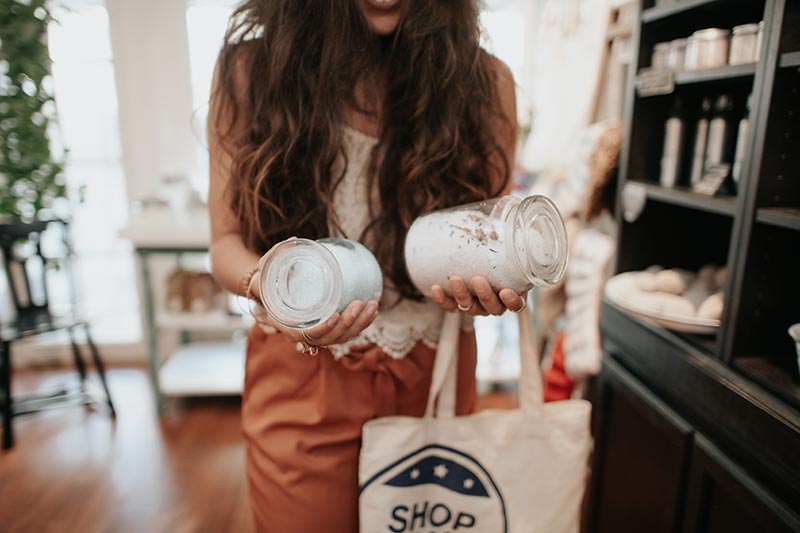
Paisley & Company
Paisley & Company’s luxurious small batch bath, body and home products not only smell great, but are also handcrafted using simple processes and clean, local ingredients. Owner Joanne Lapic chooses the least-processed options for every ingredient in her more than 60 different products and blends them without the use of harmful processes or chemicals.
But for Paisley & Company, sustainability extends far beyond the products being sold. “I think for most retailers sustainability is measured by the products they choose to carry, but since we are a manufacturer, our environmental decisions extend to other areas too, most importantly packaging,” Lapic says. “I can choose organic grapeseed oil, but the bottle I put it in will be either glass or plastic, and almost certainly made in China.” To offset that footprint, Paisley offers refill discounts and encourages customers to bring back their containers to purchase their favorite products by the ounce. They also use recycled paper bags and shipping materials and keep recyclability and fuel waste in mind when preparing shipments for delivery. paisleyandcompany.com
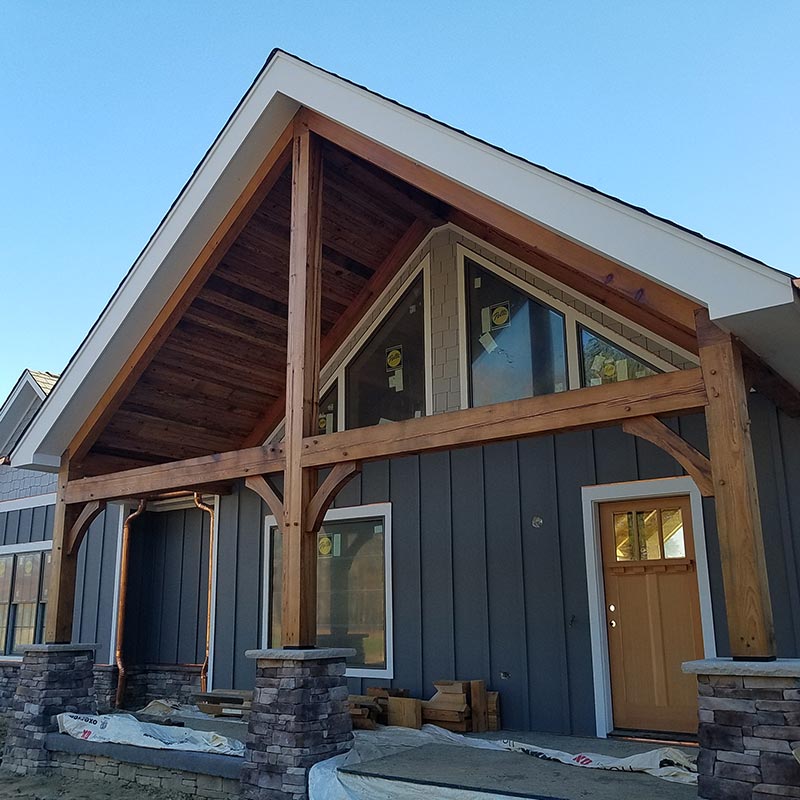
Green Mountain Timber Frames
A rise in demand for reclaimed materials is good for the earth and for business, at least for Green Mountain Timber Frames, based in Reading. The custom carpentry company has been designing and crafting timber homes and frame barns since 1990 and has recently started to see an increase in demand for projects using reclaimed timber.
While reclaimed projects only account for a small amount of Green Mountain’s business right now due to higher labor costs for dismantling and refinishing the wood, they are seeing a surge in interest in recycled trusses, ceiling beams, accent walls and furniture. Owner Bruce March says, “we recently purchased Heart Pine timber that was recycled from an old Case Tractor factory in Wisconsin. The building was originally constructed in 1901 and the timbers were 200 to 300 years old at the time of original construction.” One thing is for sure, the owners of these custom projects are not only supporting sustainability, they’re buying a piece of history. gmtimberframe.com
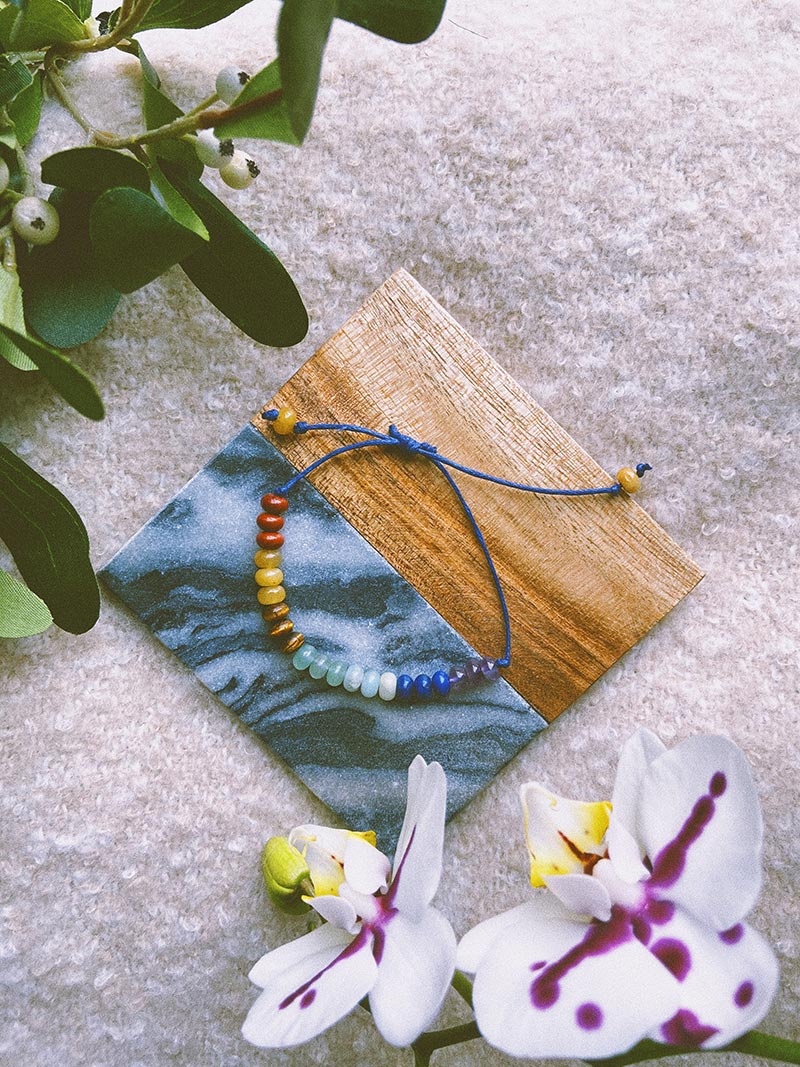
Forever Cairn Jewelry & Gifts
Tricia Williams opened Forever Cairn to share her passion for saving the planet with others. She wanted to start a business that would allow her to embrace her creative side, but also to give back. When she discovered One Tree Planted, a nonprofit organization that plants a tree for every dollar donated, her vision came together. Since its inception, the Cairn Collective has planted more than 5,000 trees and is committed to donating $1 from every sale in the future.
Environmentally savvy shoppers can browse bracelets and earrings made by hand in the Forever Cairn Studio as well as jewelry and other fair-trade gifts from women artisans in India through Williams’ partnership with World Finds Fair Trade. She has also teamed up with local artist George Kunder, who crafts wood and resin earrings from materials sourced in local yard waste sites. Forever Cairn also ships all orders using 100 percent compostable materials. This dynamic collective of artists and environmental activism is what makes Tricia’s mission of building a nature-focused community possible. forevercairn.com
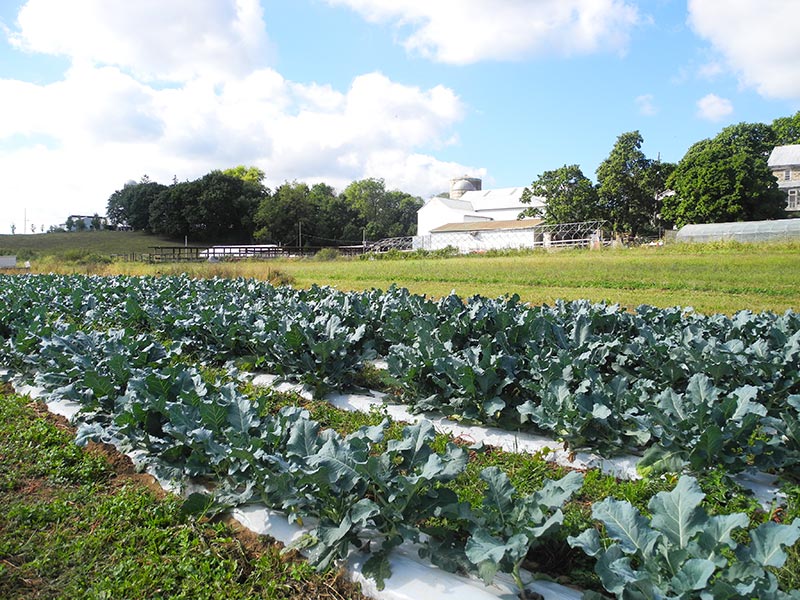
B&H Organic Produce
B&H Organics’ Erica Lavdanski believes that her customers should be able to support local food while still preserving the pristine Lancaster County farmland where it’s grown. B&H has taken their passion for preservation one step further by adhering to the stringent regulations that are required to be a certified organic farm. “For us being organic isn’t a sales strategy; I don’t charge more for my products than anyone else does,” Erica explains. “We choose to be certified organic because we think there needs to be a place in the food system where chemicals aren’t allowed.”
And that space in the system is growing exponentially. The requirements for being certified organic include using certified seed, soil and fertilizers that were not always so widely available. In fact, when Erica started working in organic farming in 2012, the options were quite limited. Today there is an entire industry that has been built because the early farmers were forced to create one. The certification also gives B&H Organics more control over the treatments used on their lands and a louder lobbying voice in Washington to help extend the sustainability of their farm beyond its borders for cleaner lands and a safer food system. bhorganicproduce.com
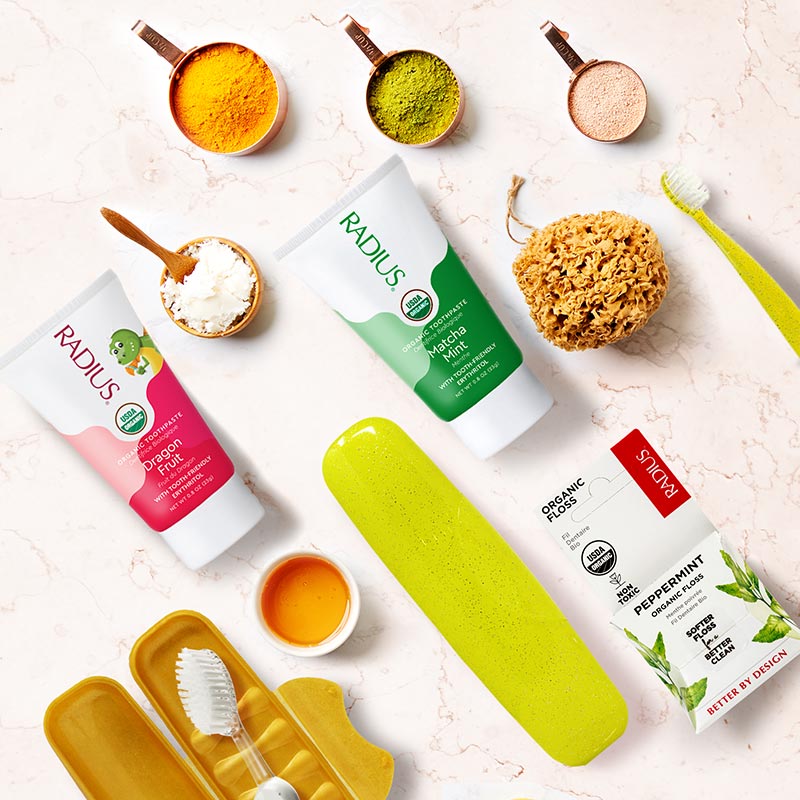
Radius
For decades, Kutztown-based toothbrush company Radius has been selling toothbrushes designed to leave your mouth – and the world – a little cleaner. Their focus is on selling products that people love, but in a way that leaves a small footprint. Every Radius toothbrush is recyclable and is made using the most sustainable products possible. And just in case one of their toothbrushes does end up in a landfill, their EcoPure® technology ensures it will biodegrade.
Radius’ molding, bristling, filling and packaging machines utilize the most energy-efficient technology available, using up to 70 percent less energy than traditional hydraulic powered machines. And each mold is designed to eliminate waste so that 99 percent of the plastic in their toothbrushes is used effectively.
But their sustainability efforts don’t stop at production. Radius was also the first oral care company to offer certified organic toothpaste and floss. That means users can naturally eliminate bacteria, remove plaque, freshen breath and whiten teeth without any of the chemicals, sulfates, GMOs or gluten found in your run-of-the-mill toothpaste. You can find Radius toothbrushes, toothpaste and floss at Wegmans and Whole Foods locally, or online at Amazon and at madebyradius.com.
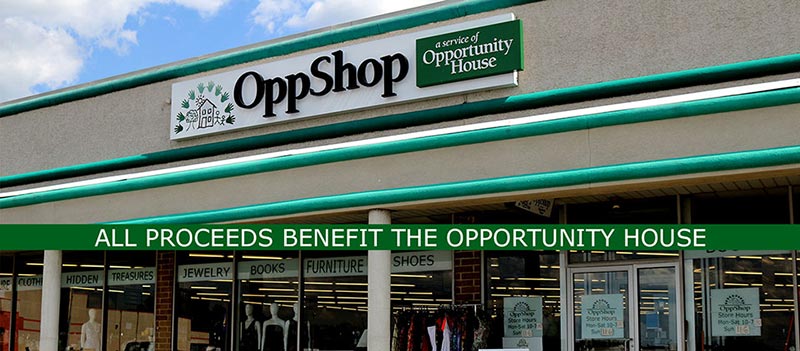
Opportunity House
Opened in July of 2015, OppShop is a retail thrift store that is part of Opportunity House’s Reuse & Recycle Program. Visit the shop for gently used treasures ranging from furniture and housewares to books and clothes. Sales help to provide short- and long-term benefits to Opportunity House clients, the agency and the community. The nonprofit generates additional revenue that is reinvested into the mission of the organization. Leftover clothing is baled and sold by the pound and books are sold both in store and on Amazon and eBay. Another OppShop goal is to not have unnecessary items end up in a landfill. Those interested in donating items can schedule a pick-up or drop off at the back of the store at 3045 N. 5th Street Highway, Muhlenberg Township, or in one of the drop-off bins. OppShop hours are: 10am-7pm, Tuesday-Saturday. opphouse.org/oppshop
















